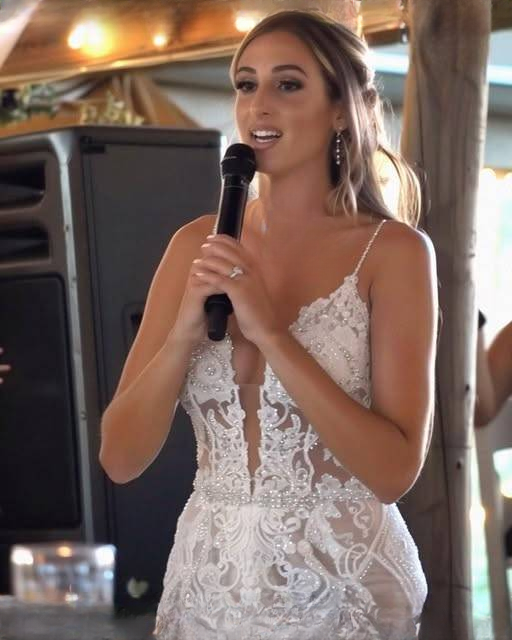The reception hall shimmered under strands of fairy lights, casting a warm golden glow over the happiest day of my life. Soft jazz floated through the air, laughter danced around the room, and everything felt like a dream. My new husband chatted at the bar, my mother dabbed her eyes with a tissue, and Daniel—my stepfather—sat quietly at our table, folding his napkin with his usual care. This man, who had given me more than I could ever repay, sat patiently in the background as I prepared to give my speech thanking everyone who made the day possible.
Then, before I could speak, my biological father stood up.
He was already a little drunk, having arrived late and downed two glasses of wine. Raising his champagne glass, his voice too loud, eyes glassy, he began, “From the day she was born, I dreamed of giving her a beautiful wedding. And today, I made that happen. Because that’s what dads do.”
I froze. The room blurred. At that moment, I was no longer in my white dress. I was six years old again, sitting on the kitchen floor, clutching a stuffed bear as my mother gently explained that my father had left—no explanations, no goodbyes. Just gone.
Over the years, he appeared sporadically—Christmas cards, birthday calls, a check here and there. Once, a check bounced. He missed every milestone: my first recital, high school graduation, nights spent crying over heartbreak. He was a ghost with Wi-Fi, posting proud comments on my mom’s Facebook updates as if he’d been part of my life. But he hadn’t. He had only watched from a distance, when convenient.
Daniel was different.
He met my mother when I was eight. Gentle, thoughtful, kind. On their third date, he brought me a puzzle. As my mom cooked dinner, he sat with me, helping me find the edge pieces. That was the first night I considered letting someone new into my heart. Daniel never pushed—he just kept showing up. For school plays, soccer games, college panic attacks. When prom overwhelmed me, I called him in tears. He arrived in jeans and a T-shirt, no questions, and drove me home with the windows down, music low.
He worked quietly, steadily, always in the background. When I got into my dream college and cried over tuition, Daniel took on a side job without saying a word. “Don’t thank me,” he said when the check cleared. “You’ve earned this.”
When I got engaged, he didn’t make speeches. He just looked at me with tears in his eyes. “He’s a lucky guy,” he said. Later, he quietly insisted on taking care of the wedding: the dress, the venue, the flowers, the band. Every detail. When I offered to help, he smiled, “This is my gift to you.” Even walking me down the aisle, he hesitated. “Only if it won’t cause drama. This day is about you.”
My biological father never asked about the date. He didn’t offer to help. When I sent the invitation, he replied three days later: “Cool. I’ll bring a plus one.” That was all.
And yet, there he was—glass raised, making a toast as if he had done it all. Daniel sat motionless, eyes cast downward, knuckles white around his napkin. My mother sat silently. My chest ached.
I couldn’t read the speech I had written. Polite, safe, sweet—it didn’t tell the truth.
So I stood.
“I want to thank everyone for being here,” I said clearly. “For celebrating with us. For being part of my life—not just today, but for years. And I want to thank the man who made this day possible. The man who never missed a birthday, who stayed up late to help with science projects, who brought orange slices to soccer practice, who worked extra hours so I could go to college. The man who never asked for credit, only gave. That man is Daniel. You are the reason I’m standing here today. You are the one who showed me what love looks like. You are the one who’s been my dad every step of the way.”
His eyes filled with tears. My mother reached for his hand, and he held hers tightly. Quiet, emotional applause rippled through the room. I walked to him, hugged him, and whispered, “Thank you. For everything.”
Behind us, my biological father stared at his untouched glass. He said nothing for the rest of the night.
Because sometimes, the people who raise you don’t share your DNA. Sometimes, the person who’s been there all along deserves to be seen—for the quiet hero they are.
That night wasn’t just a wedding. It was a celebration of real love, of earned fatherhood, and of a bond built not on biology, but on loyalty, care, and unwavering presence. For the first time in my life, I stood up for the man who had always stood up for me.
